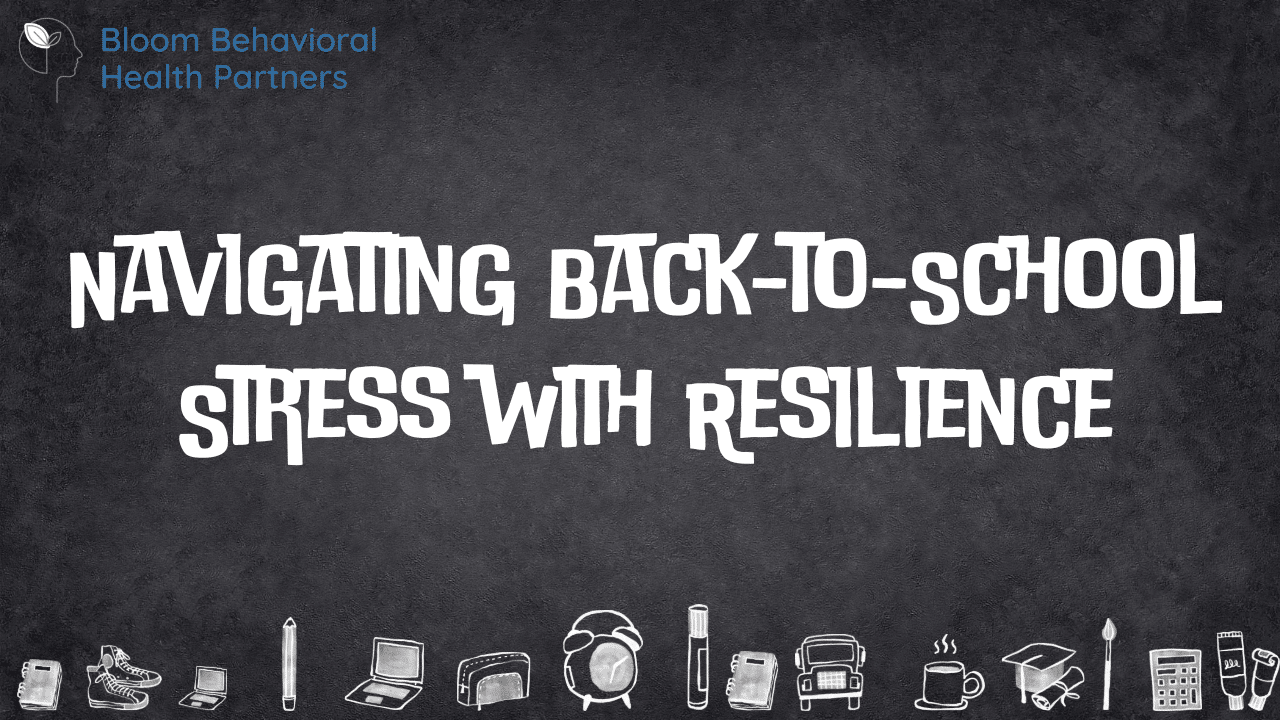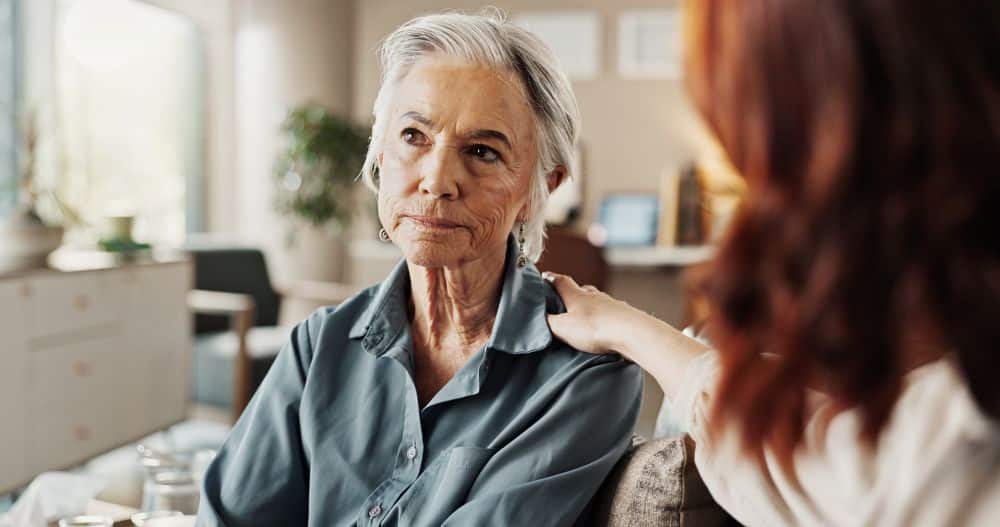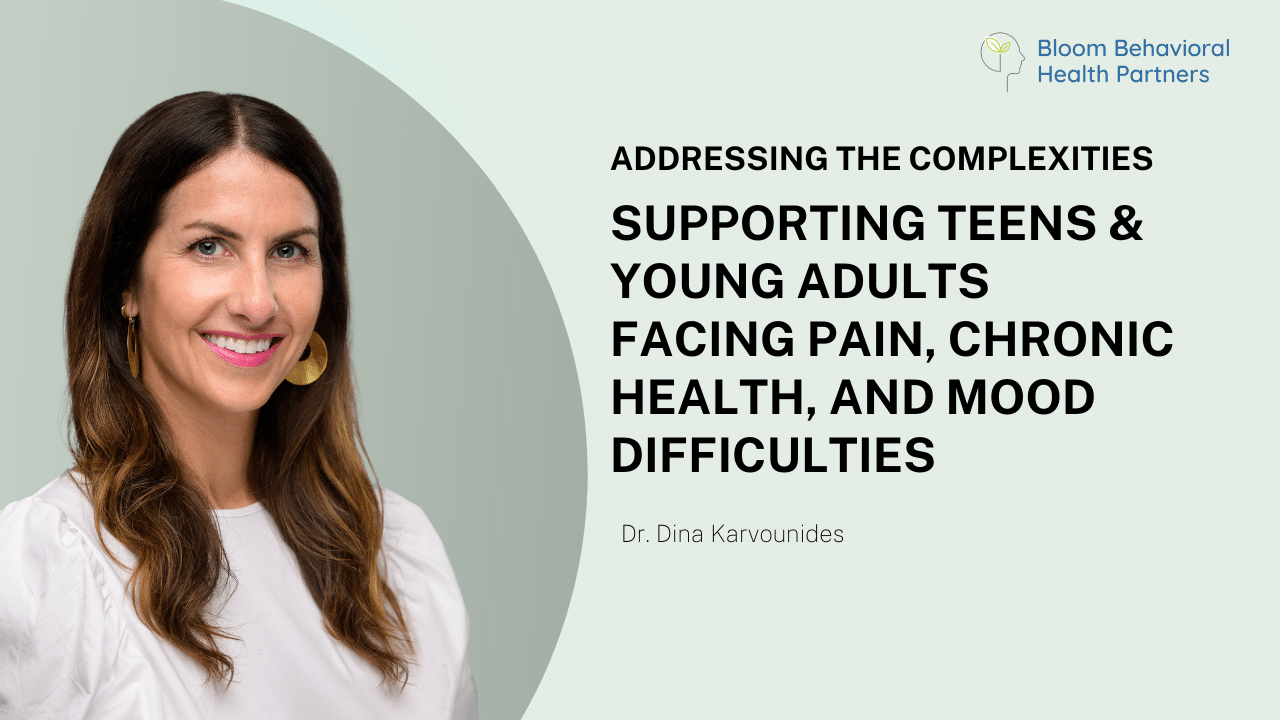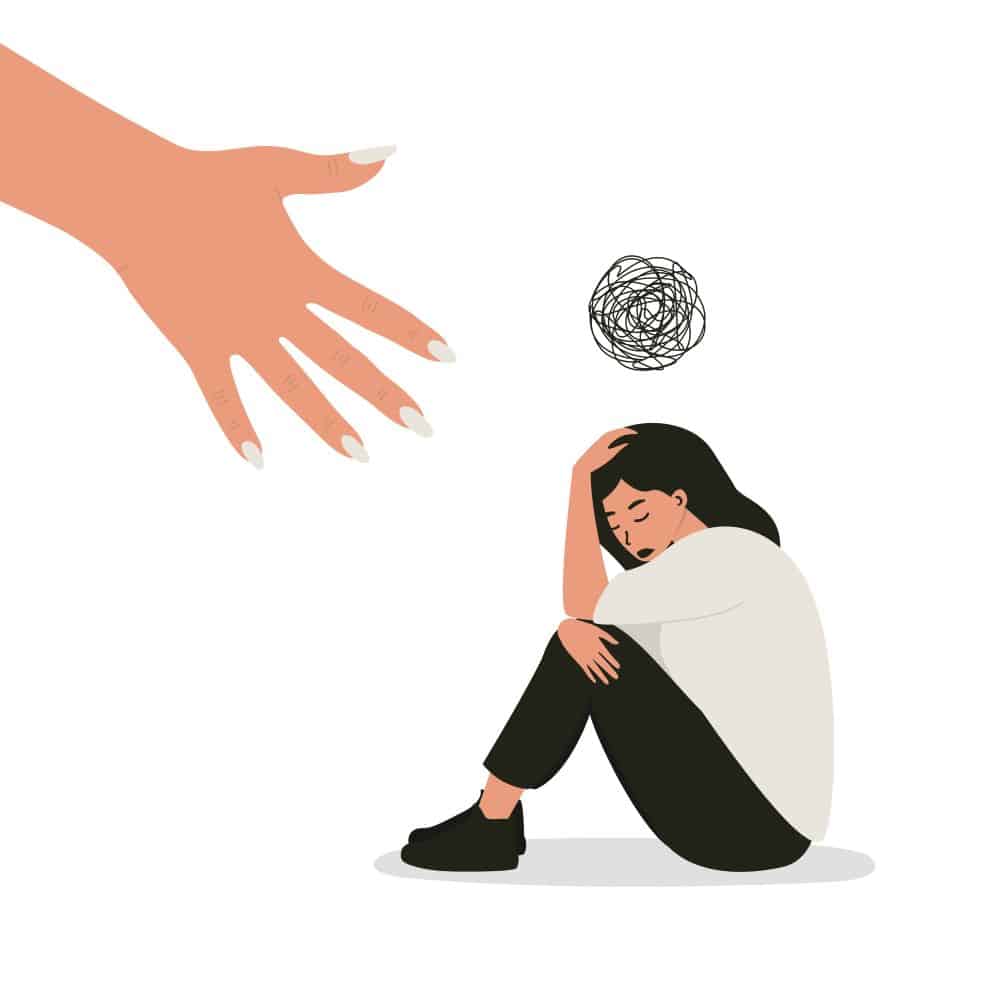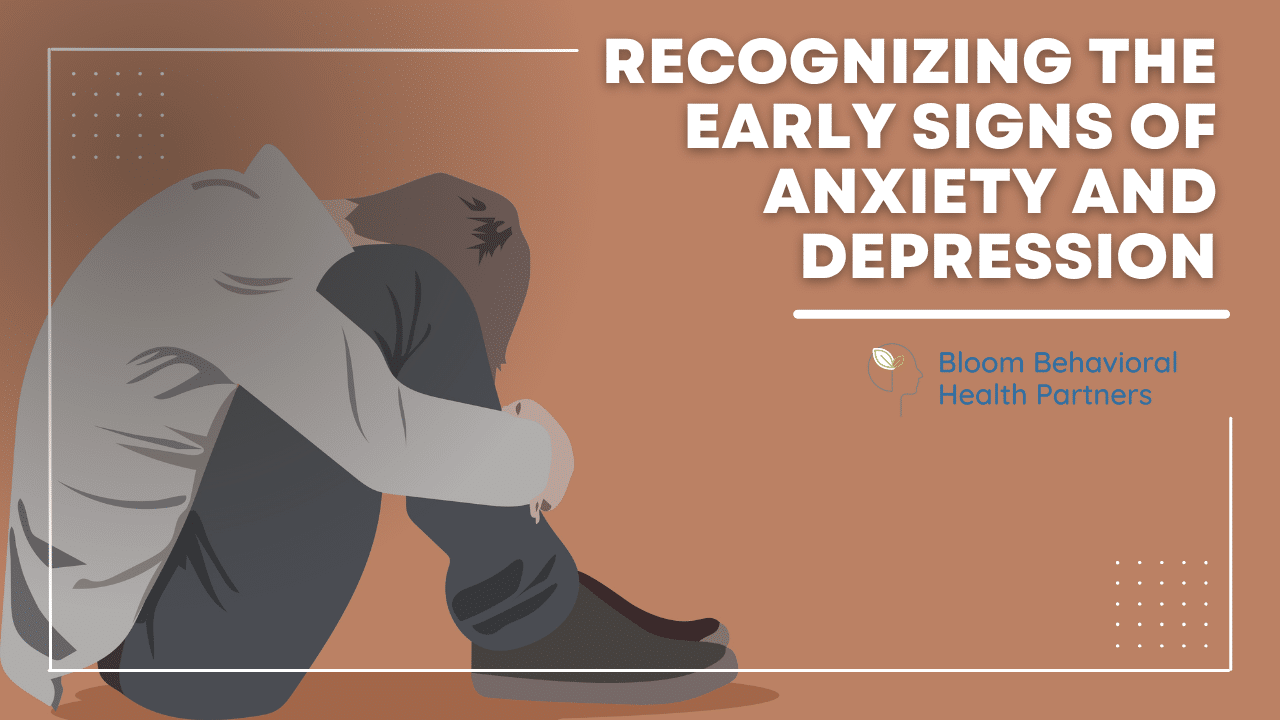
Is This Just Stress? Recognizing the Early Signs of Anxiety and Depression
Life throws a lot our way, and it’s completely normal to feel stressed. Deadlines, financial worries, relationship ups and downs – these can all leave us feeling overwhelmed and exhausted. But what if that feeling of being “stressed out” starts to linger, change your daily life, or feel like something more profound? How do you know when it’s more than just a bad week, and when it might be the early signs of anxiety or depression?
At Bloom Behavioral Health Partners, we often hear people wondering this very thing. It’s easy to dismiss persistent changes as “just stress,” but recognizing the subtle shifts early on can make a huge difference.
Here are some examples of what those early signs might look like, and when it might be time to consider reaching out for professional support.
Beyond the Usual Stress: What to Look For (Adults)
Stress is typically a reaction to a specific trigger and tends to subside once the stressor is gone. Anxiety and depression, however, can be more pervasive and persistent.
Changes in Your Routine and Habits:
- Appetite Shifts: Are you suddenly eating significantly more or much less than usual? Stress can sometimes cause minor changes, but a consistent lack of appetite or an urge to “stress eat” for days or weeks could be a red flag.
- Sleep Disturbances: We all have a restless night now and then. But if you’re consistently struggling to fall asleep, waking up frequently, or finding yourself sleeping excessively (much more than usual, even when you’re not physically tired), it’s worth noting.
- Loss of Interest in Hobbies & Activities: Remember that hobby you used to love – painting, hiking, reading, gaming? If you find yourself completely uninterested in it, or even the thought of doing it feels like too much effort, that can be a significant sign. It’s not just “not having time;” it’s a lack of desire.
- Social Withdrawal: Feeling less inclined to spend time with friends and family is common when busy. But if you’re actively avoiding social situations, turning down invitations more often than not, or feeling drained after even brief interactions, it could be more than just stress.
Shifts in Your Mood and Feelings:
- Persistent Irritability or Edgy Feelings: Are little things suddenly setting you off? Do you find yourself snapping at loved ones more easily? While stress can make us short-tempered, persistent irritability, feeling constantly on edge, or having trouble relaxing could point to anxiety.
- Constant Worry or Feeling Overwhelmed: It’s normal to worry about important things. But if you find yourself worrying excessively about things you can’t control, replaying scenarios in your head, or feeling a constant sense of dread, that’s more indicative of anxiety.
- Persistent Sadness or Emptiness: We all have bad days. But if you’re experiencing a pervasive sense of sadness, hopelessness, or an inexplicable emptiness that lasts for weeks, it’s a strong indicator of depression. This isn’t just “feeling down;” it’s a heavy, lingering cloud.
- Fatigue Even After Rest: Feeling tired when you haven’t slept well is expected. But if you’re constantly exhausted, even after getting a full night’s sleep, it could be a symptom of depression. Your mind can be as draining as physical labor.
Physical Symptoms Without a Clear Cause:
- Muscle Tension & Headaches: Chronic stress can cause these, but if they become persistent, severe, or are accompanied by other symptoms, it’s worth considering.
- Digestive Issues: Upset stomach, nausea, or changes in bowel habits can be linked to anxiety and stress. If these are ongoing and can’t be explained by diet or other medical conditions, they might be emotionally driven.
When to Seek Professional Support for Children
It can be particularly challenging for parents and caregivers to distinguish between typical developmental stages and the early signs of a mental health concern in a child. While every child is different, here are key indicators that suggest seeking professional help might be beneficial:
- Significant Behavioral Patterns:
- Sudden or Escalating Defiance: While all kids push boundaries, a sudden, marked increase in tantrums, aggression, or oppositional behavior that is disproportionate to the situation can be a sign that they are struggling to cope internally.
- School Avoidance or Decline: A sudden refusal to go to school, persistent complaints of physical illness (stomach aches, headaches) that coincide with school days, or an unexpected drop in grades can often mask underlying anxiety or depression.
- Changes in Emotional Expression and Self-View:
- Pervasive Negative Self-Talk: A consistent pattern of saying things like, “I’m stupid,” “I can’t do anything right,” or “No one likes me,” suggests low self-esteem and potentially depression.
- Increased Worries or Fears: While childhood fears are normal, excessive or constant worry that interferes with daily activities, such as an inability to sleep alone or participate in age-appropriate activities due to fear, points toward anxiety.
- Regression: A return to younger behaviors, such as bedwetting or thumb-sucking, especially after a period of having stopped, can be a sign of distress.
- The Need for an Additional Safe Space:
Child therapy is not always about fixing a “problem”; often, it’s about providing a child with a safe, neutral space and a professional adult to talk to.
- If your child is going through a significant life transition (divorce, moving, loss of a loved one), therapy offers a vital resource for processing those big feelings.
- If you notice your child seems unable to open up to you or other trusted family members, a therapist can become that trusted, non-judgmental adult who helps them find their voice and tools for emotional management.
If these patterns are persistent (lasting more than a few weeks), intense, and interfere with your child’s functioning at home, at school, or with friends, it’s time to reach out.
When Is It Time to Talk to a Professional? (Adults and Children)
If you recognize several of these signs in yourself or a loved one, and they have been persistent for more than a couple of weeks, or if they are significantly interfering with daily life – work, school, relationships, or overall well-being – it’s time to talk to a professional.
Think of it like this: if you had a persistent cough, you wouldn’t just ignore it and hope it goes away. Mental health is no different.
The Benefits of Therapy for Anxiety and Depression
Seeking therapy for anxiety and depression is a sign of strength, not weakness. It provides a safe, confidential space to explore what you’re experiencing and develop healthy coping mechanisms.
- Understanding Your Triggers: A therapist can help you identify the root causes and triggers of your anxiety or depression.
- Developing Coping Strategies: You’ll learn practical tools and techniques to manage symptoms, challenge negative thought patterns, and regulate emotions.
- Improving Relationships: By understanding yourself better, you can communicate more effectively and improve your connections with others.
- Regaining Control: Therapy empowers you to take an active role in your mental well-being, helping you feel more in control of your life rather than at the mercy of your symptoms.
At Bloom BHP, our compassionate therapists specialize in helping individuals and families navigate the challenges of anxiety and depression. We believe in a personalized approach, working with you or your child to create a path towards greater peace, resilience, and joy.
Don’t dismiss what you’re feeling as “just stress.” Your mental health matters, and reaching out is the first step towards feeling like yourself again, or even discovering a stronger, more resilient you.
Ready to explore if therapy is right for you or your child? Contact us today for a confidential consultation.

